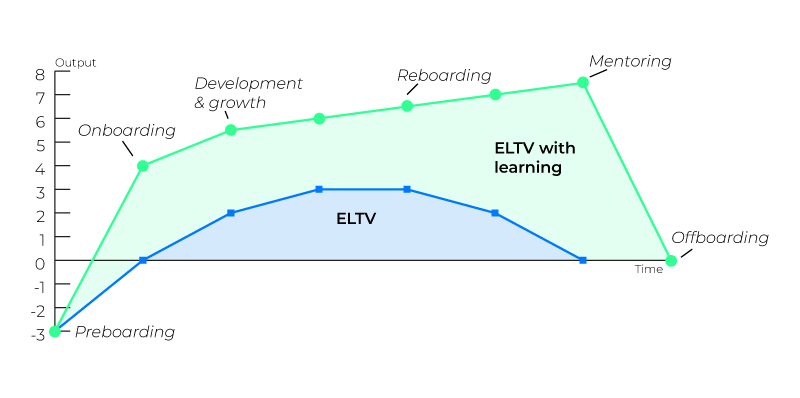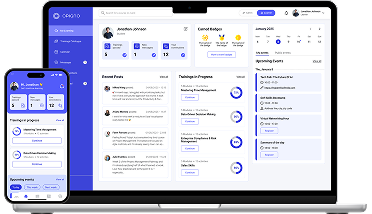Building training processes from scratch is a serious commitment, and to many, spending money, time, and effort on training an employee who can leave at any moment might seem unreasonable. Such organizations try to save costs and provide sporadic training when its need is the most apparent — for onboarding, compliance, etc.
However, this strategy only hurts employee retention and hinders productivity, while consistent development attracts talent, incentivizes 70% of workers to stay (87% for millennials!), and fuels success.
Top companies are almost five times more likely than lower performers to have extensive learning cultures, while solid development practices increase employees' performance by more than 20%.
Throughout the employee lifecycle, there are many opportunities to maximize employee lifetime value (ELTV) — the total value an employee brings over their career in revenue, customer satisfaction, and innovation — through training.

Organizations that focus on improving employees' time-to-productivity with onboarding, increasing their output, and prolonging their tenure with continuous development can achieve 3–6 times higher ELTV.
Self-directed learning fits continuous learning needs far better than formal classroom training. Learning Management Systems (LMS) provide a platform for structured, self-directed learning and development throughout the employee journey. 64% of organizations view delivering learning when and where needed as an essential characteristic of a learning culture.
Let's explore how LMS optimizes employee experiences and drives effectiveness through John, a salesperson at a global luxury brand boutique.

Preboarding
Preboarding is the initial interaction between an organization and its new hires before their start date. Not every company conducts preboarding, but those that do lay the groundwork for a positive employee experience, long-term engagement, and retention.
An LMS is one of the most effective tools for preboarding. It provides a central online hub with orientation materials and relevant resources on company policies, procedures, and employee benefits.
Now, back to John. As John receives the job offer, the company opens up access to its LMS for him, where he delves into a welcome video message customized to his job role, introducing the company, the department, and his future teammates. Through introductory modules, John learns about the brand's rich history, its commitment to excellence, and the expectations set forth for employees. He peeks into his future workplace through a virtual tour. He explores his upcoming onboarding roadmap and learns about resources and support channels available within the organization.
Without LMS, John would have had to wait until onboarding to receive this information, potentially leading to confusion or feeling overwhelmed on his first day. But thanks to the online courses, he's prepared for the journey ahead and feels like he belongs to the new workplace.
Onboarding
Enthusiastic, John officially joins the company and embarks on a comprehensive onboarding via the LMS.
Onboarding is pivotal for new hires to assimilate into their roles, organizational culture, and operations. With an LMS, the company can equip employees with the knowledge and expertise needed to represent the brand consistently and effectively and deliver exceptional customer experiences, regardless of the number or location of the workers.
Through interactive microlearning modules, workshops, and simulations, John absorbs vital knowledge to excel in his role, from understanding the boutique's floor plan to learning about the intricacies of product collections, customer interaction standards, and sales techniques. Quizzes, challenges, and rewards encourage him to compete with other new hires to finish the onboarding faster and with better results.
Compliance training is another critical component of onboarding, especially in industries governed by strict regulations and procedures, like healthcare, manufacturing, transportation, etc. The LMS facilitates the administration and tracking of compliance certification programs, delivers recurring training sessions, assessments, and evaluations to maintain compliance and proficiency in the field, and ensures that employees remain up-to-date with industry standards and best practices.
John completes compliance training on product knowledge, customer interactions, and ethical standards and earns certifications, ensuring he represents the brand with integrity and professionalism.
The LMS provided a structured and interactive learning experience, allowing John to learn at his own pace and revisit topics as needed. The virtual workshops and gamification elements facilitated interaction and connection with teammates. Had he relied solely on classroom sessions or manuals, it could have been less engaging and harder to retain information.
Development & growth
Professional growth extends far beyond the initial onboarding. At the heart of this journey lies the culture of ongoing development, and LMS serves as a cornerstone in supporting learning throughout the employee lifecycle.
Over his tenure, John's commitment to personal and professional growth shines through. Leveraging the LMS's resources, he refines his sales skills and expands his product knowledge.
John actively engages in peer-to-peer learning initiatives, sharing insights and best practices with colleagues worldwide via webinars and forums. He even created several micro-courses on objection-handling tricks and professional literature and uploaded a SCORM-based course on a new sales software he found.
Recognizing his potential, John sets his sights on a managerial position, takes ownership of the learning journey, and embarks on a dedicated learning path. Through targeted assessments and feedback mechanisms, he learns about his strengths and development areas.
Thanks to the LMS, John wasn't dependent on sporadic training sessions or colleagues for information but consistently had access to a vast library of learning resources. This allowed him to continually develop his skills, stay updated on new products, and acquire new knowledge relevant to his career aspirations. After five years of exemplary performance, John's dedication paid off as he reached the position of regional branch sales director.
Reboarding
As John transitions into his new managerial role, he moves to a new office and starts a reboarding process. It's a critical stage, focusing on the reintroduction and reintegration of employees after career transitions, parental leave, sabbaticals, or remote work arrangements.
The LMS-enabled communication channels, like discussion forums, chats, and virtual collaboration spaces, allow employees to reconnect with colleagues, seek guidance, and share experiences, easing the transition. Via the LMS, John acquaints himself with his new team, office policies, and strategic objectives.
He refines his leadership skills, including team management, strategic planning, data-driven decision-making, regional market specifics, analytical software, and laws and regulations governing the sale of luxury goods. John collaborates with counterparts from other branches, exchanging insights and sales strategies.
The LMS smoothly transitioned John into his new role by providing relevant information and training materials for his managerial position. It accelerated his learning curve and prepared him for his new responsibilities.
Mentoring
As a sales director, John is now responsible for establishing training programs for his team. LMS provides him with a robust and user-friendly toolset for creating engaging learning content that doesn't require many technical skills. He shares his expertise and insights, guiding junior colleagues on their professional journey and fostering a knowledge-sharing culture where experienced professionals impart insights, guidance, and real-world perspectives to their peers.
This peer-to-peer learning model promotes camaraderie, innovation, and collective growth, enriching the organizational culture and propelling individuals toward their full potential. John's experience using the LMS empowered him to share his knowledge and guide others through the platform, perpetuating the benefits he experienced.
Offboarding
After three years of managing the luxury goods company's regional branch, John decides to start a career in another industry. Thus begins his offboarding phase.
Through curated learning resources, knowledge-sharing forums, video tutorials, and documentation repositories, John creates new training materials and documents best practices and insights accumulated during his tenure, leaving a lasting legacy and supporting his colleagues' professional growth. This knowledge transfer ensures continuity in operations and empowers remaining employees to build upon existing foundations and drive innovation and efficiency within the organization.
John completes an exit survey via the LMS, sharing his employee experience and highlighting areas for improvement. The company will then use this actionable data and sentiment analysis to enhance employee engagement and retention.
By providing such a positive offboarding experience, the company cultivates enduring connections with former employees. Even though John is no longer a part of the company, he remains a valuable ambassador for the organization, contributing to talent acquisition efforts and brand reputation.
Exceeding individual growth
John's experience exemplifies how an LMS can optimize personal journeys within an organization. However, the LMS's impact extends beyond any employee's individual growth. LMS is a strategic tool for fostering a culture of continuous learning, driving employee engagement, and unlocking the full potential of the workforce:
- Standardizing training: The LMS ensures consistency in knowledge and skill development across the organization, leading to a more uniform and competent workforce.
- Reducing costs: The LMS eliminates the need for extensive classroom training and manual material distribution, resulting in cost savings.
- Improving knowledge retention: The LMS's interactive learning modules and readily accessible resources enhance knowledge retention compared to traditional methods.
- Promoting knowledge sharing: The LMS facilitates peer-to-peer learning, ensuring the expertise doesn't leave the company with an employee.
LMS offers a holistic approach to employee development and engagement while enabling dynamic learning experiences that adapt to individual needs and organizational objectives. By harnessing the power of technology and innovation, organizations can empower employees to thrive in a rapidly evolving landscape, drive innovation, and achieve collective success across every stage of the employee journey.
Published on March 12, 2024
